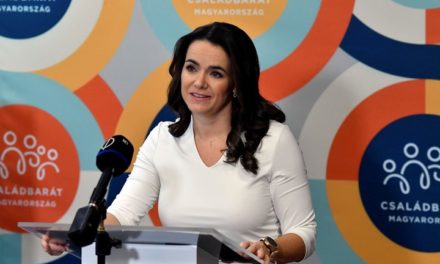As early as 2025, the standard of living will rise noticeably.
On Monday, Prime Minister Viktor Orbán discussed the 21 measures of the New Economic Policy Action Plan with László Parragh, the president of the Hungarian Chamber of Commerce and Industry (MKIK), in the Karmelita monastery, announced Bertalan Havasi, the prime minister's press officer.
During the meeting, it was established that the world economy has changed as a result of the coronavirus epidemic and the war. In order for Hungary to be successful even in this situation, new solutions and new economic policy tools are needed. By ensuring economic neutrality, it is possible to achieve economic growth of between 3-6 percent in 2025.
Viktor Orbán said: the New Economic Policy Action Plan is based on three pillars: increasing the purchasing power of incomes, ensuring affordable housing, and the Sándor Demján Program, which aims to double the size of businesses.
At the hearing, Viktor Orbán explained: he considers the many years of cooperation between the government and the management of the Chamber of Commerce to be successful and effective, and he is ready to continue this.
According to Mandiner's analysis, the new direction announced by Viktor Orbán, the policy of economic neutrality, will bring a significant increase in the standard of living for families as early as 2025, and earnings may increase by more than 10 percent per year in the years to come.
Those with children fare best, but young people can also count on new subsidies with the 21-point economic action plan, whose measures can be classified into three large groups:
- people's incomes can increase substantially, thereby significantly raising the standard of living of families,
- affordable housing becomes available to everyone, primarily by supporting access to property,
- and domestic micro-small and medium-sized enterprises receive significant support for their growth, strengthening their competitiveness and access to the international market .
A significant part of the set goals will be realized next year. In the coming weeks, it will be decided by how much the minimum wage and the guaranteed minimum wage can rise in 2025, 2026 and 2027.
Trade unions and employers can also accept the government's proposal, i.e. the annual increase of the minimum wage by 12 percent and the guaranteed minimum wage by 10 percent.
As a result of the largest and most important government measures in the coming years, the income situation of all Hungarians will improve. This means that family incomes can grow well above inflation. According to the 21-point economic action plan
- next year, the family tax allowance will increase by 50 percent compared to the current figure, and by 2026 by 100 percent,
- by 2028, the minimum wage may increase to one thousand euros and the average wage to one million forints, if the trade unions and employers agree on the details of the three-year wage agreement,
- and the young they can get a so-called worker's loan with 0 percent interest.
Not only direct income-related measures would help the situation of families and especially young people. According to the government's plans, it would be introduced among the measures related to housing
- the voluntary 5 percent interest ceiling for home loans,
- 50 percent of SZÉP card top-ups
- and as a one-time option, voluntary pension fund contributions could be used for housing purposes.
The government will keep the previously introduced benefits and benefits, as well as the 13th monthly pension. This means it will still be available
- family tax relief,
- tax exemption for mothers with four children,
- tax exemption for those under 25,
- tax exemption for mothers under 30,
- tax relief for first-time married couples,
- relief for first-time home buyers,
- and other employment-related benefits also related tax benefits.
All this means that not only those with children, but also young people can receive significant support in the coming years.
Prime Minister Viktor Orbán already announced this summer that the government will double the family tax allowance by 2026 at the latest. That means in 2026
- those with one child receive HUF 20,000,
- those with two children receive HUF 80,000,
- those with three children receive HUF 198,000 tax relief,
- and those with more than three children receive an additional HUF 33,000 per child.
Due to the war and global economic challenges, the family tax allowance will increase by 50 percent next year, expected to start in July, and families can expect to double the current amounts from January 2026.
Negotiations on the mandatory minimum wage are still ongoing, although many details have already come to light. The government and the social partners want the partners to reach a long-term agreement.
The government has already proposed what kind of salary increase path should be followed in the coming years in order to
the minimum wage should rise to 1,000 euros and the average salary to one million forints within the foreseeable future.
The process of political and economic transformation taking place in the world is becoming faster and more spectacular, in response to which Prime Minister Viktor Orbán announced Hungary's new economic policy strategy at the beginning of September. Recognizing the processes of world system change at an early stage, the Prime Minister emphasized that economic neutrality is our only option in a changing, block-bound world, so that the growth of the Hungarian economy will significantly exceed the growth of the European Union.
MTI
Mandarin
Cover photo: In the photo published by the Prime Minister's Press Office, Prime Minister Viktor Orbán (b) talks with László Parragh, president of the Hungarian Chamber of Commerce and Industry (MKIK) (j) in the Karmelita monastery on October 28, 2024.
MTI/Zoltán Fischer













